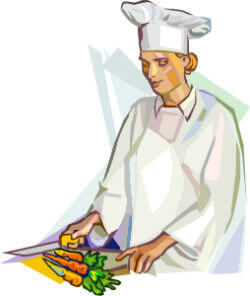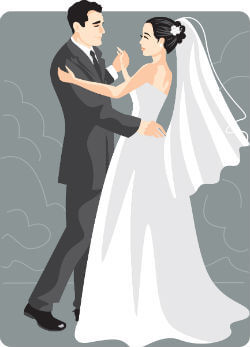English Participles
English participles have several different functions in the English language. So let's make them clear and easy to understand.
Click Here for Step-by-Step Rules, Stories and Exercises to Practice All English Tenses
What does "participle" mean?
What is a participle?
The word participle
comes from a Latin word which means "a sharing, partaking" (or in other
words, participation).Participle definition
A participle is a form of the verb that is used together with another verb to form certain tenses.For example:
 I am eating an apple.
I am eating an apple.
EATING is a form of the verb EAT.
It is used together with another verb (AM) to make the present progressive tense.
So EATING is a participle.
 I have washed the dishes.
I have washed the dishes.
WASHED is a form of the verb WASH.
It is used together with another verb (HAVE) to make the present perfect tense.
So WASHED is a participle.
In English there are mainly two kinds of participles: the present participle and the past participle.
Present participle
The present participle ends in "-ing".Examples of present participles:
- Walking
- Helping
- Drinking
- Taking
- Past
progressive
- Present
progressive
- Future
progressive
- Past
perfect progressive
- Present
perfect progressive
- Future perfect progressive
Example sentences:
- They are dancing
together right now.
- John was painting
the wall all morning.
- I will be sleeping by the time you come back.
Click here to read the full article on the present participle.
Past participle
The past participle ends in "-d" or "-ed", in case of a regular
verb, or differently, in case of
an irregular
verb.Examples of past participles:
- Walked
- Helped
- Drunk
- Taken
Example sentences:
- They have danced
together in the past.
- John had painted
the wall before he sold the house.
- I will have fallen asleep by 8 o'clock tomorrow.
Example sentences:
- The wall was painted by John.
- The apple was eaten by me.
- We were given some good advice.
Participles as adjectives
Both the present participle and the past participle can be used as adjectives.For example:
| Present participle | Past participle |
| Boring Interesting Confusing Amazing Annoying Exciting |
Bored Interested Confused Amazed Annoyed Excited |
Example sentences:
| Present participle | Past participle |
| The movie was very boring. That book was so interesting. His message was a bit confusing. What an amazing speech! You really are annoying . . . James has an exciting job. |
Why do you look so bored? She is very interested in music. I feel quite confused. We were quite amazed to see her. The audience became annoyed. We are so excited! |
Participles are used together with helping verbs (also called auxiliary verbs).
Click here for the English Helping Verbs e-mail course.
Present Participle Practice
Read the following story. The present participles are underlined.After reading, you can do the exercises.
At
a Wedding
Bob and his mother are at his sister's wedding. His mother seems
worried and keeps asking him questions.Bob: Isn't this wonderful, Mom? Ann is getting married today.

Mom: Yes, yes. It is.
Bob: Aren't you excited?
Mom: Of course. I'm also feeling anxious. What if something goes wrong?
Bob: What could go wrong?
Mom: Well, where is the minister?
Bob: He's standing by the door talking to Uncle Pete.
Mom: Ok. Well, what about, Dan, the groom? Where is he hiding?
Bob: Remember, he is waiting in the room next door. He will come in when the music starts.
Mom: Fine. Maybe I'm just worrying too much. But I just want today to be perfect for your sister.
Bob: It will be. Relax. Look, everyone is here. Aunt Sara and Uncle Mike are talking to John and Pam over there. Sally and Louise are standing in the corner laughing about something. Even Grandpa Mike is enjoying himself. See? He is sitting in the front row smiling.
Mom: I suppose you're right.
Bob: I am. Just relax. And just think, after this, we will get to go to the reception and everyone will be able to have fun.
Mom: Oh! The reception. Oh dear. I should have called the caterer (person bringing food) and checked to be sure they had everything they needed.
Bob: I'm sure they are ok. They are professionals. They do this all the time.

Mom: But what if the ovens aren't working and the food gets cold?
Bob: They are bringing lots of food warmers to keep the food hot, remember?
Mom: Oh, right. And what about the drinks? What if the bartender (person who makes drinks) is having trouble finding the reception?
Bob: He works at the hotel where we are having the reception. I'm sure he knows how to get there.
Mom: And the dance floor. What if it is too small?
Bob: People will manage. Not everyone dances at the same time.
Mom: What if nobody dances?
Bob: People always dance at weddings, Mom.

Mom: I guess you're right. Maybe I should just relax.
Bob: Yes. Relax and enjoy the day. Your only daughter is getting married. This is exciting.
Mom: I know. But I'm going to miss her.
Bob: She's not going anywhere. She and Dave are staying in town. They'll be living ten minutes from you.
Mom: But if she's married, I don't want to bother her. I won't call her as much as I do now.
Bob: Mom, you aren't bothering her when you call. She loves talking to you.
Mom: Are you sure?
Bob: Yes, I'm sure. She told me this morning how much she loves you and how happy she is to be living close to you.
Mom: Really?
Bob: Yes.
Mom: Well, that makes me very happy to hear.
Bob: It should. Not all daughters enjoy being with their mothers.
Mom: This is true. Oh! The music is starting. That must mean that it's time for the wedding to start.
Bob: It does. Look, here comes Ann now. She looks beautiful!
Mom: Yes, she does!
And now, practice:
At a Wedding - Exercises
Vocabulary Questions
1. What does "anxious" mean?a) nervous
b) sad
c) happy
d) angry
b) sad
c) happy
d) angry
2. What does "caterer" mean?
a) a person who makes drinks
b) a person who plays music
c) a person who brings food
d) a person who works at weddings
b) a person who plays music
c) a person who brings food
d) a person who works at weddings
3. What does "professional" mean?
a) happy
b) expert
c) understanding
d) unsure
b) expert
c) understanding
d) unsure
Grammar Questions
1. He is sitting in _________ front row smiling.a) a
b) the
c) an
d) that
b) the
c) an
d) that
2. They _________ lots of food warmers to keep the food hot remember?
a) bring
b) are bringing
c) brought
d) have brought
b) are bringing
c) brought
d) have brought
3. He works _________ the hotel where we are having the reception.
a) in
b) at
c) on
d) of
b) at
c) on
d) of
Comprehension Questions
1. Who is getting married?_______________________________________________________________
2. What worries Bob's mother about the food?
_______________________________________________________________
3. What worries Bob's mother about the dance floor?
_______________________________________________________________
Get Updates, Special Offers, and English Resources
Download your FREE GIFT (the first two chapters of
English Short Stories Book and Workbook)
as soon as you join!

By submitting your email, you consent to receiving updates and newsletters from us and to the sharing of your personal data with third parties for the purposes of sending you communications. We will not spam you. You can unsubscribe at any time. For more information, please see our privacy policy.
Return from English Participles to Easy English Grammar
Return from English Participles to Learn to Write in English








